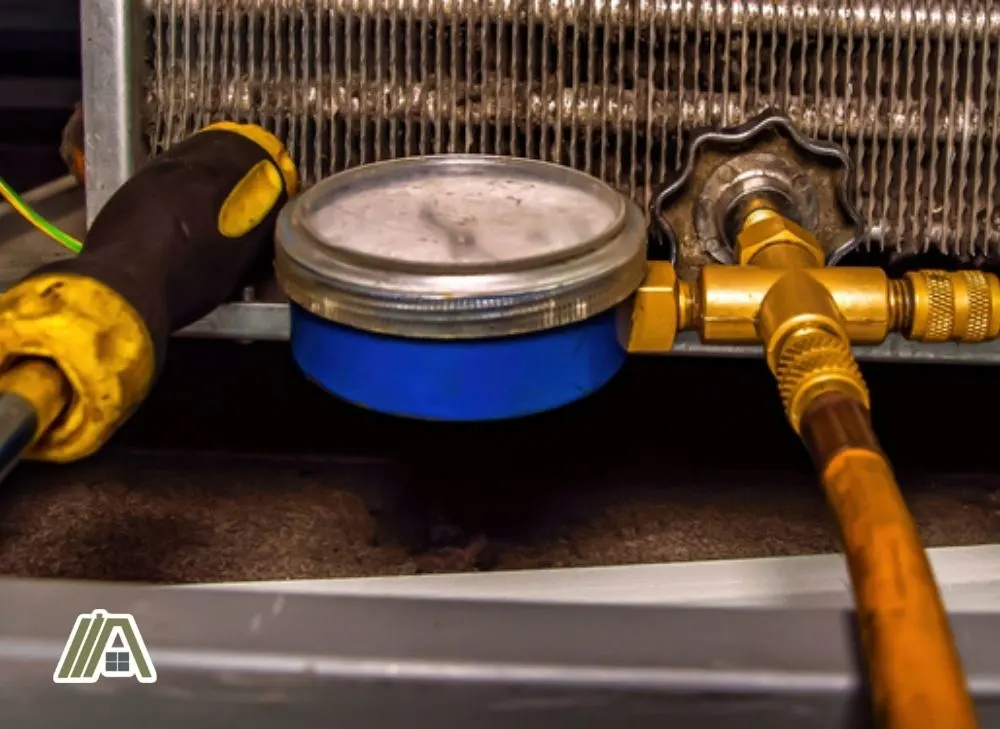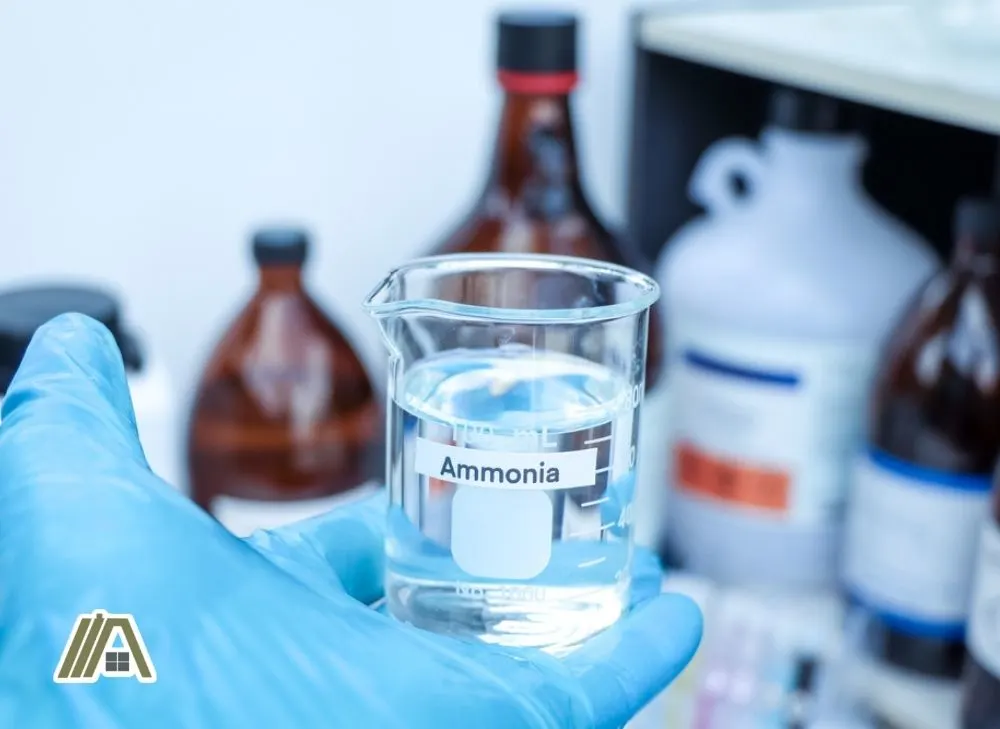A smelly fridge is often thought of as an annoyance rather than a health concern. However, there are scenarios where a strong scent from your fridge can put your life in danger.
Whether the smell is coming from rotten food or the chemical components of the refrigerator unit, various adverse health effects can be induced by viruses, bacteria, Freon, and more that make themselves known by creating a stink.

Rotting or sour odors in the fridge indicate that food is off and contains microbes that cause food poisoning. Musty smells indicate mold, which is a respiratory allergen. Musty/chemical odors in older units can mean toxic Freon leaks. Ammonia can leak from RV fridges and pose a serious threat to health.
1. Rotting Smell in Fridge
Although refrigerators are meant to preserve food for as long as possible, it is still common for your fridge to smell like rot.
Even for those who are careful to use things before they go bad, a single perishable item, missed in your weekly clear-out, can start to decay and produce this smell.
This often happens when a small item like a baby carrot or a grape tomato escapes its packaging and begins to rot when dropped behind a veggie drawer or wedged against a corner or the back of a shelf.
Since the drip tray of a fridge collects condensation, which can develop odors, it is also important to look in the drip tray for the smelly culprit.

Additionally, it is wise to look under and behind the fridge for dropped food items since the smell might be coming from around your fridge but not from it.
Can Become Dangerous
Bad smells themselves are not very dangerous, although high enough concentrations of certain gaseous substances can cause headaches, nausea, and possible difficulty breathing.
But the most dangerous part of having food rot in your fridge is the food itself.
Food that is no longer fresh begins to lose its nutritional value the longer it sits.
Additionally, food that is past its expiration date is likely to give you food poisoning, whether this poisoning is from bacteria, viruses, or other microbes that can cause illness.
These microbes can spread to other food, causing more food to rot and increasing the chance of food poisoning.
Food poisoning symptoms include fever, muscle cramps, and upset stomach.
Severe food poisoning can lead to emergency room visits if the symptoms won’t let up.
Cleaning and Prevention
Although food poisoning is a scary thing, it can be prevented through management of perishables, which reduces food waste, checking your fridge often, and cleaning your fridge regularly.
In most cases, it is easiest to take out all of the drawers to make the inspection of the fridge easier.
Be sure to check in hard-to-reach corners and other areas.
Once you’ve found the offending item, remove it and clean the area with a wipe.
If the offender isn’t found in the main area of the fridge, it could be behind or under the fridge, so be sure to look there.
Additionally, the drip tray that collects condensation should be checked since rotten smells can emanate from here too.

For all fridges, the drip tray is located near the bottom. It is best to consult the owner’s manual on how to access it.
If the manual is of no help, the kick panel at the front of the fridge near the bottom can be tilted and then pulled out.
Once you’ve accessed the drip tray, it can be cleaned with antibacterial wipes or a bleach solution.
Although range hoods can be essential to get rid of cooking smells, they aren’t able to clear out the smell from a fridge since the fridge is often closed, trapping the odors in there until the doors are opened.
2. Fridge Smells Sour
Solid foods rotting are not the only danger to your health.
If there are sour smells emanating from your fridge, it is likely that liquid spills, particularly dairy or raw meat juices, have become the breeding grounds for bacteria and other microbes.
These organisms often release sour smells associated with milk that has past its due date and other liquid items.
Liquid spills are often harder to find than solid food items that are rotting.
Milk is often the same color as the interior of the fridge and can blend in.
Raw meat juices are often clear and also blend into the interior of the fridge.
The fact that these are liquids and lie flat on a surface can also make them difficult to spot, whether they are under veggie trays, in other drawers, or elsewhere.
Risks of Sour Fridge Smells
The main cause of food poisoning or foodborne illness is associated with bacteria and other microbes.
These organisms thrive in and feed on food items that have aged and begun to rot.
Bacteria can either cause an infection in your digestive tract, or they can produce toxins or poisons that make you sick when ingesting the food they have made their home.
Common bacteria that create sour fridge smells and lead to food poisoning include Salmonella, E. coli, and Listeria.
Bacterial food poisoning symptoms include gas, bloating, diarrhea, and vomiting.
Severe dehydration is a common occurrence in those with food poisoning, which can require hospitalization to correct. Severe dehydration is a fatal condition if left untreated.
Cleaning and Prevention
One great way to clean a fridge is with a simple substance you probably already have at home: vinegar.
Vinegar is a popular household cleaning agent because it is a more natural substance than commercial chemical cleaners.

It can be used on glass, stainless steel, toilets, and more.
Vinegar, because it is an acidic compound, can dissolve mineral deposits, clean up dirt and grease, and can even kill bacteria.
It has a strong smell that some may not enjoy (my brother won’t even be in the same room as a bag of salt and vinegar potato chips), but vinegar’s cleaning ability gets rid of sour smells in the fridge and the vinegar smell also overpowers this scent until both dissipate.
I know I would rather smell vinegar than sour, spoiled liquids from the fridge!
If the smell is too much for you, you can always use apple cider vinegar, which smells sweeter and more pleasant.
Using vinegar instead of less natural products with stronger chemicals can get the same job done without all the negative side effects and dangers.
3. Fridge Smells Musty
Food that is full of viruses, bacteria, and microbes can certainly cause health problems, but the mold that occurs when food rots can cause problems without having to ingest this food.
Mold is a common allergen and it spreads quickly through airborne spores. They are fungi, like mushrooms, so they are not closely related to viruses and bacteria.
The spores act similarly to seeds and allow the mold to spread through animals, air, or water.
Growing mold prefers wet, organic places, making the fridge perfect.
Mold helps to break down materials that are decomposing. Outside, this means that they congregate on dead animals and plants. Inside, this means that they gather on fruits, vegetables, and other food items that are aging.
Dangers of Mold
Mold produces allergy-like symptoms similar to those experienced by sufferers of a pollen allergy.
These allergy symptoms include sneezing, itching, difficulty breathing, headache, and more.
For those with respiratory conditions like asthma, mold in the fridge can be even more dangerous, leading to difficulty breathing.
Mold can also create problems for those who have compromised immune systems, such as those with HIV or AIDS. Those with these issues will have their respiratory health negatively impacted.
Proximity to mold and its spores is what creates problems for those with asthma, allergies, respiratory illnesses, or compromised immune systems.
If the mold is isolated to the kitchen, you might notice coughing or sneezing around meal prep time or even whenever you are in the kitchen.

However, since mold grows and spreads so quickly, the spores can move readily through the air or even attach to animals and humans, thus infiltrating your entire home. Bathrooms and basements, which have high moisture levels are most likely to be the next targets of mold.
What was once a small, isolated problem in the kitchen may become a whole-house problem. Can you imagine the spores entering your HVAC system! Unless you have a unit like the Reme Halo the mold will almost instantly be in every room of the house.
Cleaning and Prevention
Thankfully, preventing mold from accumulating in your fridge and spreading to the rest of your home can be achieved through simple cleaning processes.
For mold outside of your fridge, many experts will recommend controlling the moisture and keeping it low enough that the mold cannot survive.
Unfortunately, fridges must retain a decent amount of moisture to allow fruits and vegetables to remain crisp and not dry out.
Since reducing moisture has been ruled out, getting rid of mold in the fridge can instead be done by physically removing it.
Mold is persistent, so a strong chemical, such as chlorine bleach, may be required for its removal.
Since bleach is so powerful, it is wise to dilute it. One cup of bleach in five gallons of water should be plenty.
It is important to note that bleach can irritate the throat, skin, and eyes, as well as leave permanent stains on clothing. For these reasons, be sure to be careful with the bleach, wear clothes that you don’t care about, and ventilate the area.
If you are hesitant to start with bleach, you can give it a bash with vinegar, but just keep an eye out for a recurrence. If the mold comes back, you’ll have to break out the big guns.
4. Chemical/Musty Odor
If you smell a musty odor but not one that can be linked to mold, it is possible that your fridge is experiencing a freon leak. This is especially true if the odor is musty but with a noticeable chemical component to it.
Freon is a non-combustible gas that was previously used in refrigerators to keep the air cool. However, most refrigerator companies stopped using Freon around 1994.

I still mention it here because they made really durable fridges back in the day, ones that are often still in use 30, 40, 50 years later. My parents only recently gave away the fridge that they had been using for the past 30+ years. It wasn’t broken, they just didn’t have space for it.
So, if your fridge was manufactured in 1994 or earlier, there is a chance that it uses Freon and this may be leaking from the unit.
Risks Associated With Leaking Freon
Freon is very dangerous, more so than other substances discussed before this.
The symptoms of Freon inhalation can impact most areas in the body, including the respiratory system, the digestive system, skin, eyes, ears, and more.
Freon inhalation can cause loss of vision, burning of the eyes and ears, severe abdominal pain, burning of the esophagus, and even necrosis in the skin!
The long-term effects, if fresh air isn’t breathed in or if the amount of Freon breathed in is high, are permanent damage to the brain and lungs as well as death.
If you think you have been exposed to Freon from your fridge, be sure to breathe fresh air as soon as possible and call your local emergency services.
Fixing the Problem
As said above, it is important to guarantee the safety of yourself and others in the household if you are experiencing the symptoms of a Freon leak. An external door in your kitchen would be very handy for situations like these.
In many areas, licensed professionals must be the ones to fix this leak.
If you would like to locate where the leak is—although it is not advisable to stay in the area where there may be one—if you mix together a concoction of soap and water and put it in a spray bottle, you can spray it onto the Freon piping.
If bubbles start to form where you spray the soapy water, this is where the Freon leak is.
If you have a refrigerator manufactured before 1994, it may be best to replace it with one without Freon.
This could save a hassle and potentially lives.
5. Fridge Emitting Ammonia Smell
The scent of ammonia, similar to urine, is one that is unpleasant and one that can be dangerous.
While not all fridges use ammonia, if you own an RV with a fridge, it is likely that it uses ammonia. However, you should not smell this chemical if everything is functioning as it should.
Liquid ammonia is combined with hydrogen gas to create a reaction where the liquid ammonia evaporates rapidly, cooling the area.

This reaction is commonly used in RV fridges since they do not require electricity, but rather propane to run. In fridges in the home, electricity is almost always used and, therefore, this reaction would not work.
The network of pipes used in this process can break down and release the contents, namely the gaseous ammonia rather than the liquid ammonia.
Risks With Ammonia Leaks
Similar to the release of Freon, the release of ammonia from a refrigerator can lead to adverse health effects.
Ammonia can burn the mouth, eyes, nose, throat, and lungs.
It is likely that a person who is exposed to ammonia will have difficulty breathing. This is especially dangerous for those with respiratory issues.
At high concentrations over long periods of time, ammonia can lead to permanent lung damage or even death.
Ammonia is also flammable. Exposure of ammonia gas to a flame can cause fires and explosions.
Fixing the Problem
If you notice an ammonia-like smell coming from your fridge, it is best to leave it closed.
Opening a fridge with an ammonia leak can lead to large amounts of ammonia pouring out of the fridge. Concentrations of ammonia like this are sure to knock you out and be of significantly more danger to you.
An ammonia leak can be identified by the scent but also yellow stains around the RV fridge and a bubbling sound coming from the back of the fridge.
If you observe any of these signs, it is best that you and other occupants exit the RV immediately.
Calling your local emergency services would be best for those experiencing ammonia-inhalation symptoms.
Unfortunately, you will most likely have to call someone to replace your RV fridge, but hopefully, everyone made it out safely.
Non-Specific Smell From Fridge
If the smell you are experiencing doesn’t seem to be noxious gases or odors indicative of food rotting, you are probably experiencing a mix of different food smells from the fridge.
Although pickle smell can be identified on its own, pickles, sour cream, chocolate milk, and other food items’ smells combined can create a weird and maybe even a bad smell.
If you know your fridge is clean and the food is too new to be off, then you can solve your issue with airtight containers.
Additionally, placing a small bowl of bicarbonate, or baking soda, can be an easy way to take care of odd smells as baking soda naturally absorbs smells.
Sources
https://www.homeserve.com/en-us/blog/how-to/clean-refrigerator-drip-pan/
https://www.healthline.com/health/cleaning-with-vinegar#benefits

